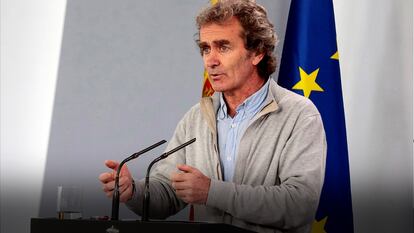Spain reports record number of coronavirus recoveries, but daily deaths rise to 325
In the past 24 hours, 6,399 coronavirus patients have recovered and been discharged from hospital, the highest figure since the beginning of the crisis

The number of daily coronavirus deaths registered in Spain was 325 on Wednesday, according to the latest figures provided by the Health Ministry. This is a slight rise from Tuesday, when the number of overnight fatalities was 301.
The total death toll since the beginning of the pandemic now stands at 24,275, a daily rise of 1.36% of the total. According to the Health Ministry, the northwestern region of Galicia reported on Wednesday 128 coronavirus victims who had died on previous days. This figure was added to the total but not to the number of daily coronavirus deaths.
In the past 24 hours, 6,399 coronavirus patients have recovered and been discharged from hospital. This is the highest number recorded since the beginning of the crisis, and brings the total number of recoveries to 108,947.
Speaking at the government’s daily press conference on Wednesday, Fernando Simón, the director of the Health Ministry’s Coordination Center for Health Alerts, said the rise in the number of recoveries was “very important.” “The evolution [of the outbreak] is very positive, in line with what we were expecting,” he said.

On Wednesday, there were 2,144 new infections, compared to yesterday’s figure of 1,308, which was the lowest number recorded, in both absolute and relative terms, since the declaration of the state of alarm on March 14.
The number of new infections only represents coronavirus cases that have been confirmed via PCR tests, which identify people with an active infection at the time of testing. Since Sunday, the government has only reported infections confirmed via this method, and not serological tests, which measure antibodies in the blood – i.e. detecting those who have had the coronavirus and recovered. Up until two weeks ago, new cases were only being measured with PCR tests. The total number of infections confirmed via PCR tests is 212,917.
The rate of transmission continues to be low, with the number of new cases representing 1.02% of the total (2,144 new infections out of 212,917 cases).
After reaching a peak of 950 fatalities on April 2, the number of daily coronavirus-related deaths began a slow descent. The fatality figures over the last week have remained stable with 331 on Monday, 288 on Sunday, 378 on Saturday and 367 on Friday.
Several regions in Spain reported fewer than two new coronavirus cases per 100,000 inhabitants, and no new intensive care admissions, according to the latest figures. This list includes Asturias, the Balearic Islands, Valencia, Extremadura and Murcia. Andalusia, in the south of Spain, the Canary Islands, and the exclave cities of Ceuta and Melilla in North Africa have also reported a drop in transmission.
Opposition criticizes deescalation plan
The Spanish government’s plan to deescalate the coronavirus confinement measures has been met with criticism from opposition parties. On Tuesday, Prime Minister Pedro Sánchez announced phases to relax the lockdown rules that would see restrictions eased over four stages, with no set dates, according to the situation in each province.

Following the announcement, the secretary general of the main opposition Popular Party (PP), Teodoro García Egea, accused Sánchez of being “directionless” and spending “more than an hour in declaring uncertainties.” “There is no plan,” he wrote in a message on Twitter.
The leader of the PP, Pablo Casado, criticized Sánchez for not first informing him of the plan, while he spokesperson of the party, Cayetana Álvarez de Toledo, insisted Spaniards “need specific dates.”
There was also a backlash from nationalist parties. The premier of Catalonia, Quim Torra, called the plan a “serious error” and an attempt to “centralize” power away from the regions. This criticism was repeated by Iosu Erkoreka, of the Basque Nationalist Party (PNV), who said “at the smallest opportunity, [the government] corners off the state structures and quickly assume the instruments of recentralization to respond to exceptional situations.”
The heated debate continued on Wednesday during a question and answer session in Spain’s lower house of parliament, the Congress of Deputies. Opposition parties used the session to accuse the government of failing to manage the coronavirus crisis and address the economic fallout of the pandemic.
Concerns from hostelry sector
The hostelry sector has expressed concerns about the conditions of the government’s deescalation plan. The plan will allow bars, restaurants and hotels to reopen in phases, but with certain restrictions to prevent a new spike in coronavirus cases.
Under Phase 1, for instance, hotels will be allowed to reopen, but guests will not be allowed in common areas, such as breakfast or lunch buffets. Sidewalk cafes and restaurants will be able to open, but at 30% of their usual capacity.
According to Emilio Gallego, the secretary of the association Spain Hostelry, which represents more than 270,000 businesses in the sector, this will not be financially viable. “Anyone who understands a little bit about the economy knows that fixed expenses represent 30% of revenue,” he told EL PAÍS. “A business can’t be opened in these conditions, and I believe most establishments will wait until the second phase.”
Gallego also explained that it will be difficult for hotels to reopen given the financial strains on the sector. “We don’t have enough funding and we need microcredits backed by the state to start up again,” he said. “Our first reaction to these measures is concern and confusion.”
With reporting from Natalia Junquera, Carlos E. Cué, Javier Salvatierra and Gorka R. Pérez.
English version by Melissa Kitson.
Tu suscripción se está usando en otro dispositivo
¿Quieres añadir otro usuario a tu suscripción?
Si continúas leyendo en este dispositivo, no se podrá leer en el otro.
FlechaTu suscripción se está usando en otro dispositivo y solo puedes acceder a EL PAÍS desde un dispositivo a la vez.
Si quieres compartir tu cuenta, cambia tu suscripción a la modalidad Premium, así podrás añadir otro usuario. Cada uno accederá con su propia cuenta de email, lo que os permitirá personalizar vuestra experiencia en EL PAÍS.
¿Tienes una suscripción de empresa? Accede aquí para contratar más cuentas.
En el caso de no saber quién está usando tu cuenta, te recomendamos cambiar tu contraseña aquí.
Si decides continuar compartiendo tu cuenta, este mensaje se mostrará en tu dispositivo y en el de la otra persona que está usando tu cuenta de forma indefinida, afectando a tu experiencia de lectura. Puedes consultar aquí los términos y condiciones de la suscripción digital.








































